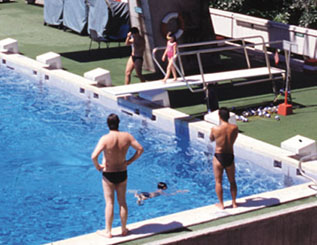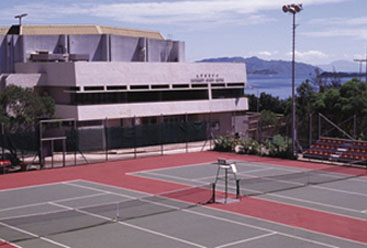 Physical Education
Physical Education Evergreen Subject
By Angela Yau
P
hysical education is no longer a privilege of primary and secondary schools. At university, a great variety of these courses, such as ping-pong, swimming, folk dancing, and softball are offered.
At The Chinese University of Hong Kong and Hong Kong Baptist University, physical education is compulsory. Every undergraduate must take two physical education courses within their three years tertiary education. Besides, some elective Physical education courses are provided.
Ms Masa Leung, a physical education instructor of the Chinese University of Hong Kong, explained that students can benefit from the compulsory course. She said, ”Physically, it enhances our fitness. Psychologically, it gives us satisfaction and improves our self-image. Socially, it provides an opportunity for students to make friends.”
Besides, she regards the courses as a means for students to use the facilities allocated to the campus. Said she: “This ensures that the sports facilities on this campus are fully utilised.”
Ms Connie Cheung, a Chinese University’s sociology student, said she enjoyed attending the physical education lessons twice a week. “It helped me to burn up some calories,” she said. “I also made a lot of friends in the lessons.”
However, some students think that these courses are rather demanding. Ms Lina Chong, an architecture student at the Chinese University, described the physical education courses as “harsh”.
“I have to rush to attend these lessons,” she said. “By the time the lesson starts, we have to show up neatly in our PE suits.
“Marks will be deducted even if the student is late one minute,” she added.
At her university, the grade for physical education, which is dependent on students’ attendance, participation and performance, is included in calculations of the grade point average. Therefore, some students worry that their grade point average will be affected by the grades in physical education.
 However, Ms Leung of Chinese University said that the examinations for physical education courses are not very difficult.
“Even if students fail in the exams, they can have another chance for re-examination,” she said.
However, Ms Leung of Chinese University said that the examinations for physical education courses are not very difficult.
“Even if students fail in the exams, they can have another chance for re-examination,” she said.
According to Ms Leung, during the academic year 1994-1995, there were 2,627 students attending the compulsory physical education courses at the Chinese University. Only 1.6 percent of them failed, whereas 8.6 percent of them got A’s.
At Hong Kong Baptist University, a written examination, accounting for 20 percent of the total mark, is included. Therefore, lectures and notes are part of their physical education courses.
Ms Wendy Fok, a freshman studying business administration at Baptist University, took a basketball course in the first semester. She said, ”During the written exam, questions concerning the history, techniques and hand signals of basketball were included.”
As the lessons are compulsory, Ms Leung of Chinese University said students may feel compelled to attend the lessons. “Therefore, instructor has to teach in a cheerful and lively manner to motivate the students,” she said.
In some universities like the University of Hong Kong, City University of Hong Kong and Hong Kong University of Science and Technology, physical education courses are provided on a voluntary basis. Miss Connie Lun, 19, a business administration student at the University of Science and Technology, regards these courses as “interesting”.
“Courses like canoeing, tai chi and jazz are provided,” she said. “If our attendance reaches 75 percent, we receive a certificate.”
However, Miss Jessica Ma, a Year 1 student studying information systems at City University, found that there was a serious shortage of physical education courses at her university. “I never succeeded in taking the physical education courses,” she said. “The facilities were insufficient. Students studying diploma and degree courses were both competing for them.”
At the University of Hong Kong, physical education courses are provided for all Year 1 students. However, attendance is not counted.
Mr. Kenneth Li, a Year 2 student studying computer science at Hong Kong University, said the physical education courses were not attractive to most students. “It doesn’t matter if you are absent for the whole year’s physical education courses,” he said. “Sport lovers would rather join the intramural competition.”
Students at universities with no physical education courses can still enjoy sports in their spare time. Miss Christine Yick, a student in the Department of Design at Hong Kong Polytechnic University, said, “A compulsory education system is too troublesome. Doing exercises should be self-motivated.”
The Chinese University’s physical education instructor Ms Leung thinks that every system in providing physical education courses has its weakness. She regards that present compulsory system as useful.
“Nowadays, people have fewer chances to do exercise,” she said. “Sometimes, all they need to use is just their fingers.”

October 1996
Return to contents
